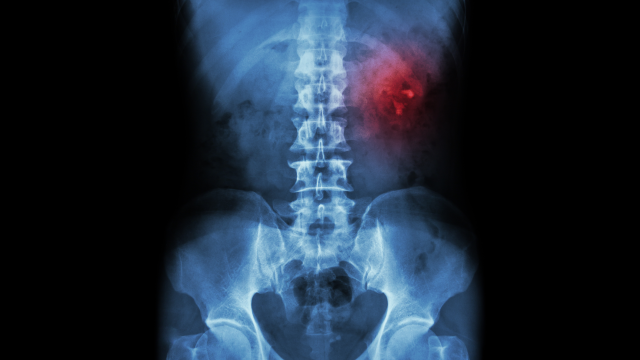Dealing with kidney stones can be one of life’s most painful and stressful experiences, to hear any sufferer describe it. That distress is even greater when it’s a recurrent problem. But researchers at the Mayo Clinic may have found a way to take some of the edge off. They have developed a publicly available calculator that they claim can quickly predict your chances of having more kidney stones after your first episode.
Kidney stones are essentially clumps of certain waste material that, for one reason or another, begin to build up in the kidney and eventually try to leave the body via the urinary tract. If the stone is small enough, you might be able to pass it without notice, but a larger stone can get stuck in the tract, causing immense pain, bloody urine, and other unpleasant symptoms until it’s passed.
People who have kidney stones are more likely to have stones again, but it’s not always clear why or how likely a recurrence is for a given person.
The calculator devised by the researchers is called the Recurrence Of Kidney Stone (ROKS) model. It was originally developed and released to the public by the Mayo Clinic in 2014, as both an online tool and smartphone app. But the original version could only predict someone’s likelihood of getting a second stone following their first episode.
In a new study published this month in Mayo Clinic Proceedings, however, the researchers detailed the creation of an upgraded ROKS. This version should be capable of predicting later episodes that need medical care no matter how many stones someone has already had.
The model was updated with the help of patient data from more than 3,000 first-time kidney stone sufferers seen at the Mayo Clinic between 1987 to 2014. These patients had been part of the pre-existing Rochester Epidemiology Project, which has kept track of the medical records from nearly all residents in Olmsted County, Minnesota, where the Mayo Clinic was founded and still remains.
These patients collectively had just under 5,000 kidney stone episodes in total, with some unlucky folks having as many as eight or more recurrences. Based on these patients’ medical histories, the authors were able to isolate over a dozen risk factors for a repeat episode. These factors include being younger, male, heavier, pregnant, and the kind of kidney stones you’ve had before (calcium stones are most common, but there are four main types).
“Each of the risk factors we identified are entered into the model, which then calculates an estimate of the risk of having another kidney stone in the next five or 10 years,” study author John Lieske, a kidney specialist at the Mayo Clinic, said in a statement.
Research, from the Mayo Clinic and elsewhere, has thought that nearly one in 10 Americans will have a kidney stone in their lifetime.
Lieske and his team hope ROKS could be used for other kidney stone studies, such as those testing out preventative treatments in people likely to have stones. Right now, though, it’s only fairly accurate in its predictions. It ranked 0.681 on the C-index, a common measure of a model’s predictability, with 0.5 indicating no better than chance and 1.0 indicating perfect fortune-telling ability (a score of 0.7 is considered good for any model). The app’s predictive powers will also need to be tested out in different populations outside Olmstead County.
Still, it’s probably worth checking out for any curious kidney stone sufferer. If nothing else, it might convince you to talk with your doctor about “adopting dietary measures and/or starting drug regimens to prevent future attacks,” said Lieske.
The ROKS online tool can be found here, with links to the Apple and Android app also available.
